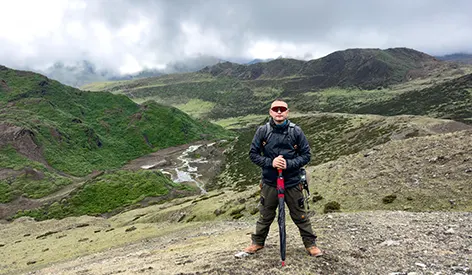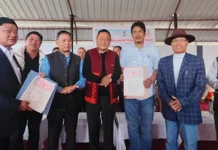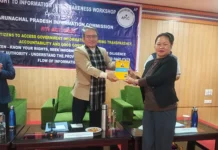[ Prem Chetry ]
TAWANG, 28 Jun: Meet Jambey Dondu from Tawang district – a nature enthusiast and keen observer, who has documented several unexplored landscapes, trek routes, and Himalayan flora and fauna to showcase the natural heritage of Tawang district.
Dondu, director of Shangri La Calling, started it in 2021. “Tawang is nothing less than a living museum of nature. My core objective is to raise awareness and pride in the natural heritage we are blessed with,” he says.
He mainly wants to inspire the younger generation of the region to take pride in their surroundings and become active custodians of it. He empirically documents and shares photographs of Himalayan flora and fauna species. He anticipates that it would promote responsible nature-based tourism. This form of tourism not only helps in supporting local livelihoods but also encourages the protection of fragile ecosystems. “When people fall in love with nature, they are more likely to protect it,” he says.
Dondu primarily uses social media platforms, including Facebook, Instagram, and X to share his discoveries and observations, which are mainly scientific and propels researchers into carrying out further researches. These platforms help him instantly connect with researchers and people across the globe who are curious about Tawang’s wild beauty.
This year, in February, Dondu documented the sighting of a flock of northern pintails (Anas acuta) at an altitude of 13,500 feet in Tawang for the first time in Tawang district. This documentation was significant in revealing a change in the behavioural pattern of this migratory species, since these birds were never seen in such a high altitude region.
“I am also planning to develop a dedicated website to showcase the region’s biodiversity, treks, and ecotourism opportunities in a more organised and accessible way,” he adds.
When asked, he said, “Yes, I have been fortunate to make some significant observations. One of my most memorable discoveries is a species of primula, photographed in Tawang, which was recently confirmed as recorded for the first time in India. Prior to this, it was only confined to Bhutan and southeastern Tibet.”
In 2020, he discovered a very rare and endangered orchid called Cypripedium tibeticum in the Mago area and central Tawang. More recently, he found another unusual flowering plant, which experts believe could potentially be new to science. A genetic analysis is currently underway to confirm this discovery.
“Apart from flora, Tawang is home to wildlife, including the iconic snow leopard, red panda, clouded leopard, takin, musk deer, marmot, Himalayan monal, tragopan, snow cock, and the wintering black-necked crane. Each species highlights how biologically important this region truly is,” he says.
“Every corner of Tawang holds its own magic, with landscapes that transform beautifully through the seasons. From vibrant, wildflower-filled summers to silent, snow-draped winters, the region is full of contrasts and wonder,” Dondu says.
Beckoning adventure and nature enthusiasts, he says that if a stretch that truly embodies the soul of wild Tawang, it would be the route from Sulungti to Gongkhar La, leading to the base of Gorichen peak in the Mago area. This region, with its hanging glaciers, alpine lakes, meadows bursting with blooms, and panoramic views of the Gorichen massif, is a dream for trekkers, birders, and spiritual seekers. “The silence in these remote valleys is not empty. It speaks, it teaches, and it transforms you,” he says.
Dondu, professionally runs Discover Shangrila, an ecotourism initiative offering immersive travel experiences in Tawang, and leads the Environmental Protection Society, an NGO based in Tawang. “What began as a personal passion has now become both my profession and my life’s mission,” he says.
He said that he launched the Shangri La Calling Festival a few years ago. His intent was to showcase Tawang’s hidden wonders, especially sacred and spectacular places like Chumig Gyatse – the 108 waterfalls – and to open new pathways for sustainable tourism that benefits local communities. “However, the event had to be postponed due to some circumstances. We are now preparing to revive it this year in the Mago region,” he informs.
This festival will not just be a celebration of nature, but also of the rich culture, heritage, and traditions of Mago. It aims to bring global attention to a region that has remained largely unexplored, while creating meaningful opportunities for the people who call it home.
“For me, Shangri La Calling is not just a passion or a profession. It is a calling. It is a call from the mountains themselves – to stand as their guardian and storyteller, and to honour the communities that have lived in harmony with this land for generations. It is where my purpose, my community, and my commitment come together,” he adds.
Chief Minister Pema Khandu in a recent visit to his home district Tawang lauded Dondu for his tireless efforts in bringing global attention to the hidden treasures of Tawang – from sacred wilderness trails to untouched cultural landscapes.





